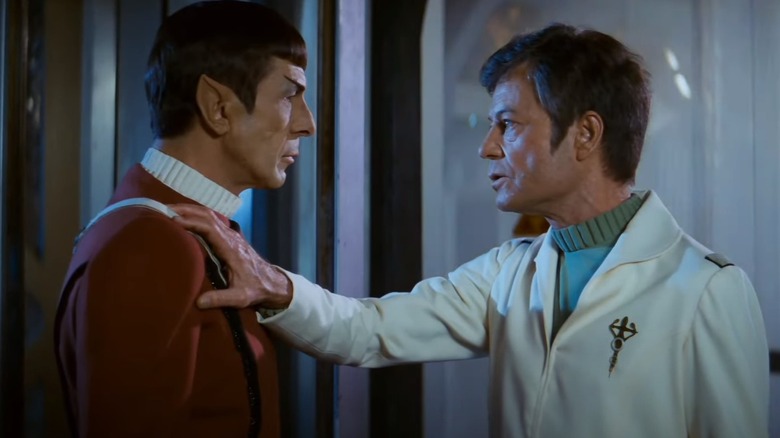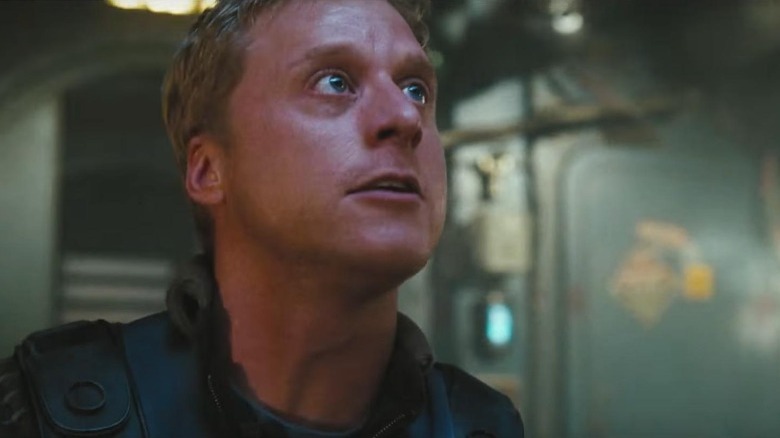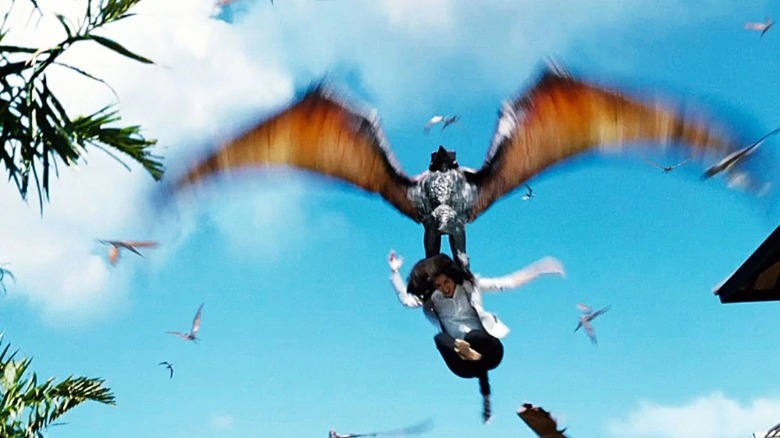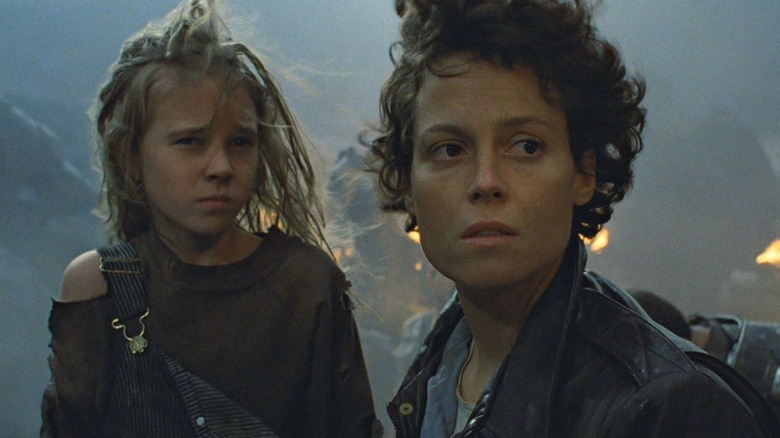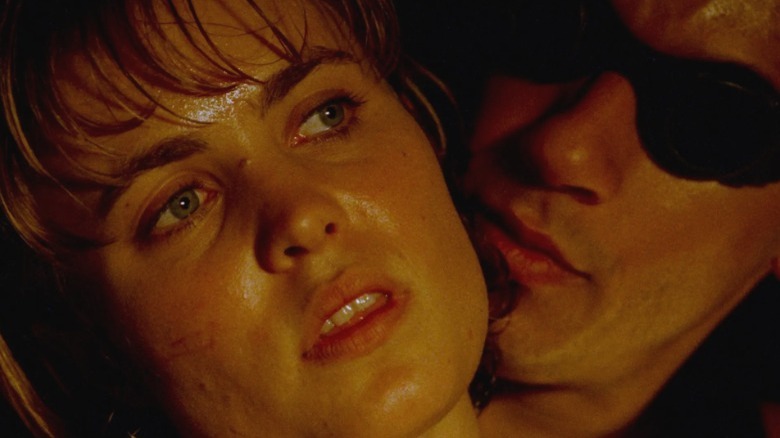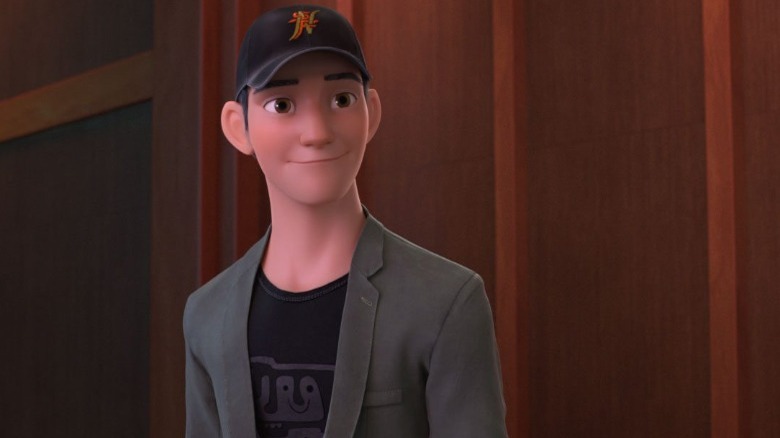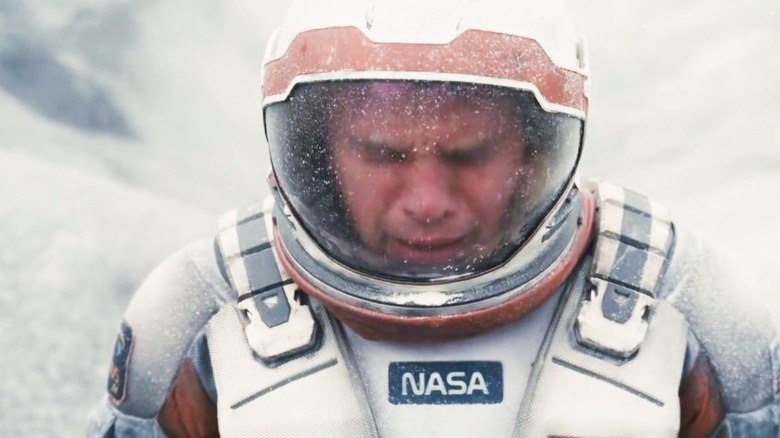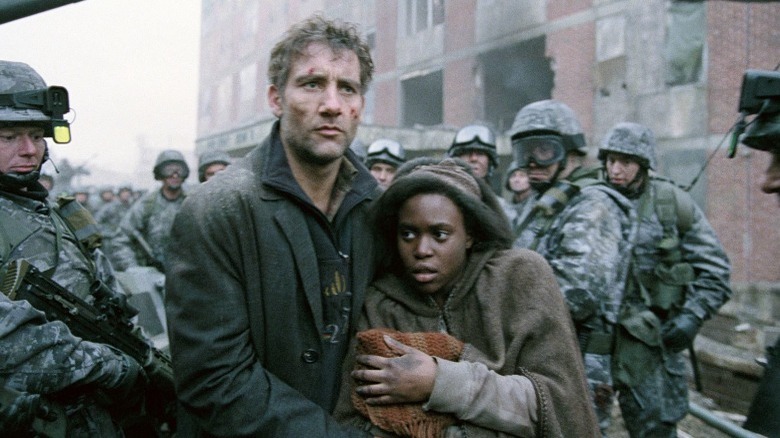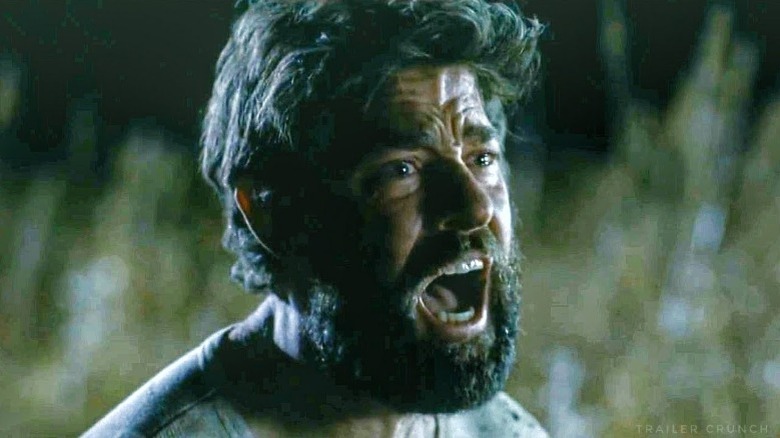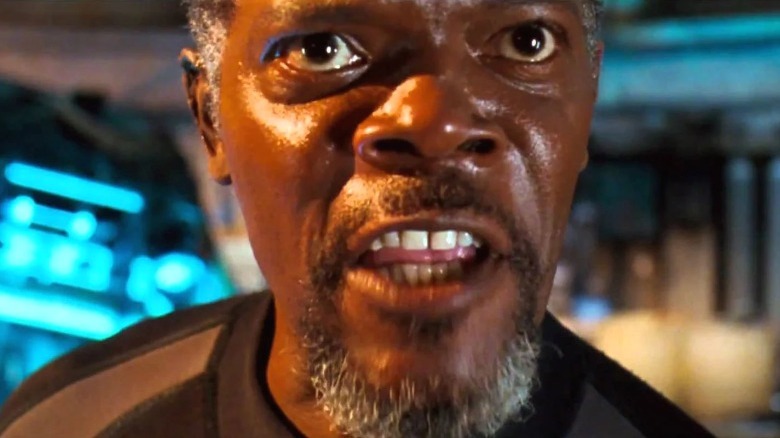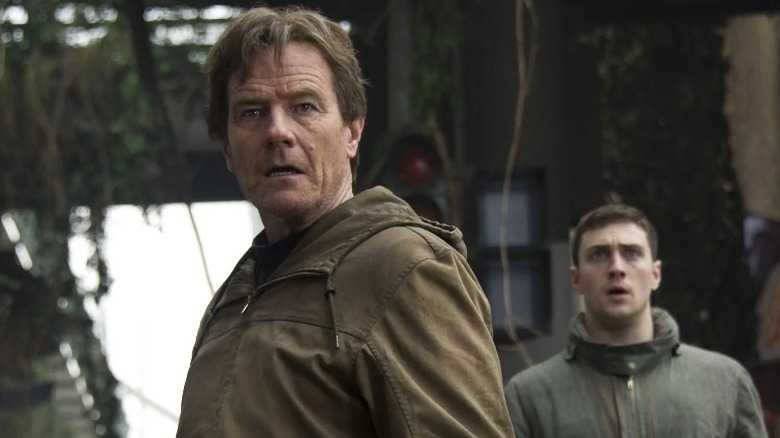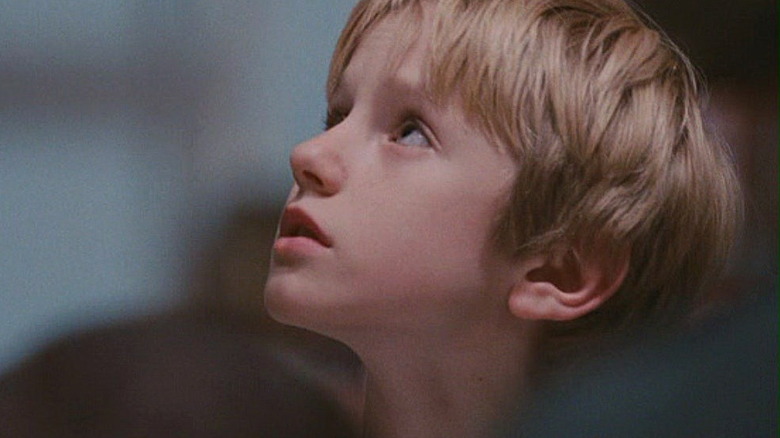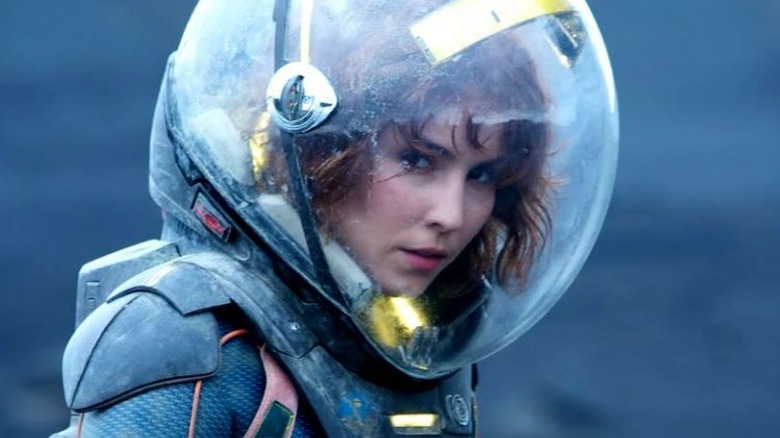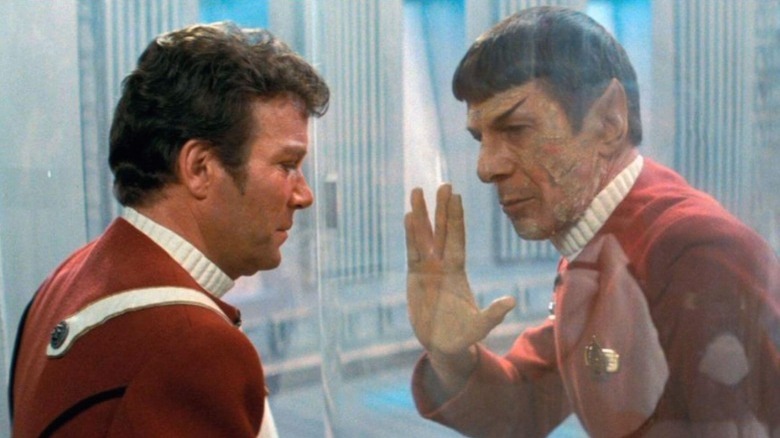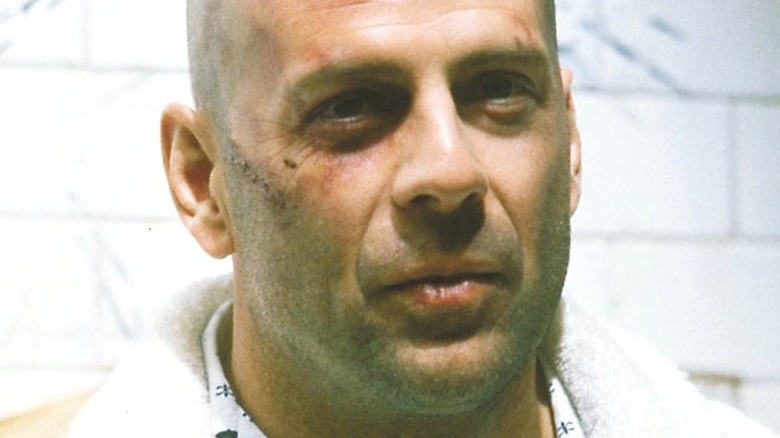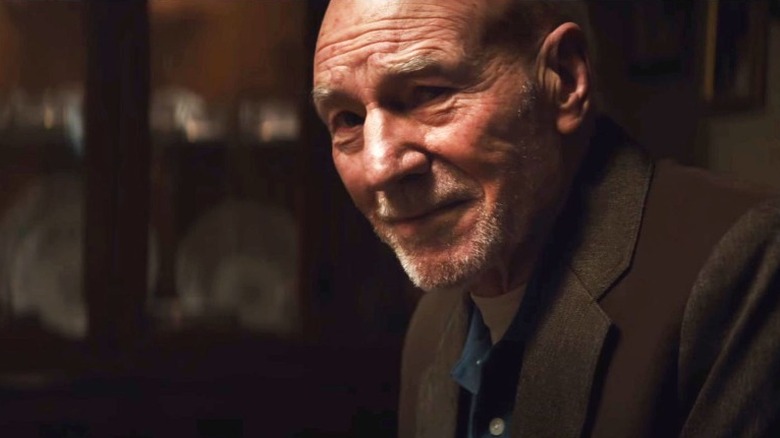Sci-Fi Movie Deaths No One Saw Coming
Death may be inevitable, but in a movie, it can come as one hell of a surprise. It's often the moment in which the story turns on a dime, changing its emotional tenor or throwing what we thought we understood into disarray. In science fiction, it's also an easy way of upping the stakes and making sure we understand that no one's safe. That doesn't mean it always works the way the creators intended.
A well-delivered shock to the plot can uplift the entire movie, using our broken comfort zone to focus us on the remaining cast and their actions and turning the rest of the film into a thrill ride. However, a badly executed surprise can sink the whole show. Sometimes, it even casts a shadow on an entire franchise. There are lessons to take away from both, so we're going to look at some of the biggest, wildest surprise deaths in science fiction. Together, we'll find out what worked and what didn't. Spoilers ahoy!
Hoban Washburne — Serenity
Joss Whedon is a cult-fave creator with big plans and a tendency to get his projects cut off at the knees. It still sucked for his fans to fall in love with "Firefly" only to watch it die in less than a season. Dedicated fanbase action built enough momentum to greenlight "Serenity," the only feature film in this truncated franchise.
"Serenity" brings back the crew for one last ride to help River, the eerie girl with some big secrets. Fans knew it'd be a tough trip going in, so the early death of Shephard Book was rough but not a big surprise. As the film raced to its climax and the Reavers came close to overtaking our beloved Firefly, it was a shock to watch Hoban Wash (Alan Tudyk), our eccentric pilot with a love of toy dinos, die by impalement. It's a harrowing but terrific moment that changes the film's tone and makes us fear even more for Malcolm Reynolds (Nathan Fillion), who comes dangerously close to a curtain call of his own against the Operative.
Zara — Jurassic World
The "Jurassic Park" franchise isn't afraid of offering up some gory surprises. The original film builds up its lawyer, Gennaro (played by Martin Ferrero) into a total slimeball. So it's a shock when he becomes dino-kibble on the big test ride through the park, but it's tempered by the fact that the guy had it coming. Most big deaths in the franchise are like this. Either they happen to the deserving or they move the plot without making us too scared for our heroes.
"Jurassic World" breaks the rules in an ugly way. Zara, played by Katie McGrath, is Claire's (Bryce Dallas Howard) assistant, and temporary babysitter. She's not enthused, and who can blame her? They're her boss' nephews. Zara is abruptly torn apart by a tag team of pteranodons and the massive mosasaur chilling in the nearby aquarium. The critical response was immediate, boiling down to the question: "What the hell was that?" Years later, we don't have a good answer, but it's the moment that helped sour a franchise revival that's never lived up to the promise of the original 1993 film.
Corporal Hicks and Newt — Alien 3
David Fincher's bedeviled mainstream outing hides a potentially great religious thriller under studio interference and special effects so bad that the Scorpion King in "The Mummy Returns" looks good by comparison. The "Alien 3 Assembly Cut" reveals more of Fincher's bleak Catholicism, making the Xenomorph's role as the devil to Ripley's Mary even clearer. It can't fix the horrible rotoscoping, though.
For fans that eagerly awaited the follow-up to "Aliens," the start of the movie is an unwelcome upset. Ripley (Sigourney Weaver) fought to save Newt (Carrie Henn), the sole survivor of Hadley's Hope, and Corporal Hicks (Michael Biehn), earning the closest thing to a happy ending we can get in this franchise. "Alien 3" throws that away and makes it clear that life has little value in this prison colony. It's a swerve that prepares us for Ripley's ritual sacrifice at the end of the darkest "Alien" film to date, but it isn't a whole lot of fun to watch. Even Ridley Scott's eventual return to the franchise can't repair the scars these two deaths left behind.
Carolyn Fry — Pitch Black
Vin Diesel's big day out, "Pitch Black," telegraphs its high stakes throughout this fairly low-budget sci-fi chiller. Few are safe as the horde of bony alien locusts shows up for a ravenous outing during an eclipse, and they're already whittled down from a horrific crash landing that decimated the crew.
The film sets up its villain protagonist, Riddick (Vin Diesel), as its eventual sacrifice. Nearly feral, the infamous criminal grows to barely tolerate the kid they're all stuck with and allows some grudging conversation with a Muslim Imam (Keith David). It's meant to feel like classic rehabilitation tropes, leading up to the villain doing something redeeming at the end. Riddick's thematic mirror, though, isn't his captor, Johns (who's eventually revealed as worthless), but the surviving pilot, Carolyn. She's carrying her own monsters along for the ride, and Riddick is as shocked as the audience when she takes over the sacrifice play that'll allow the rest to escape. This is a great swerve that allows Riddick to later take his throne as a cult fave.
Tadashi — Big Hero 6
Disney detractors have plenty of legitimate ammo to use on the kid-friendly industry giant, but the accusation that Disney prefers to go gentle on its characters makes no sense when there are still people getting over the death of Bambi's mother. Disney's not above offering a gut punch when it counts, and they opened 2014's cute sci-fi animated movie "Big Hero 6" with a whopper.
Based on a comic set in the fringes of the Marvel universe, tech kids are bringing the future home in San Fransokyo, a sprawling coastal city. Hiro, a 14-year-old with a gift for nanotech, adores his big brother Tadashi. Tadashi's working on a new medical robot called Baymax, and they've both got a bright future ahead — except that Tadashi is blown up about 10 minutes into the movie. Holy heck! It's one of the most stunning openings in Disney history, almost as shattering as "Up" and a clear signal that this story is about the most difficult healing of all, recovering from your emotional wounds. Tadashi may be gone in a blink, but his spirit remains throughout the film.
Dr. Mann — Interstellar
Christopher Nolan loves a good plot twist. His career was founded on them, with both "Memento" and "Insomnia" relying on tight character arcs that suddenly unravel into turbulence. He's comfortable with big deaths that move the plot, but emotional arcs aren't his best feature. Yet, Nolan gave "Interstellar" his all, and a sudden plot change in the second half puts a dark twist on the film's theme of hope in the face of isolation.
Dr. Mann is one of the original scientists to take part in the mission to ensure the survival of humanity. It was enough of a surprise on release that he's played by Matt Damon, but it's an even bigger twist that Mann is the closest thing "Interstellar" has to a villain. Driven to desperate measures by an uninhabitable planet and a lack of hope, he overrides warnings and attempts a shaky manual docking to try to take command of the Endurance. He goes so far as to begin a ranting monologue, only to undergo rapid decompression mid-sentence. Where Cooper's faith is eventually rewarded, Mann's selfishness demands a shocking price.
Theo Faron — Children of Men
"Children of Men" isn't a peppy feel-good movie. By the third act, we're frankly begging for some hope in this ruined future. There is a ray of light. Kee (Clare-Hope Ashitey) has given birth to a healthy child, and her cries are lively enough to pause a street-to-street battle in a beautiful, staggeringly transcendent moment.
However, the hope Theo (Clive Owen) fought for is fleeting. The battle flares right back up the moment he and the new mother fade from sight, and what she and the audience don't know is that Theo's been fatally wounded. He hides it long enough to get Kee offshore, and there's a vessel ahead that may be part of the last-ditch effort to rekindle humanity's fertility. Theo dies in a slow-moving shock to our system, abruptly closing our narrator's door on what happens next. We're left without answers, with the fading sounds of children's laughter as the credits roll to give us one last potential glimpse of happiness.
Lee Abbot — A Quiet Place
"A Quiet Place" puts its feet up on the table right at the beginning when the Abbot family, who's managed to survive an alien apocalypse this long, lose their youngest son. Beau (Cade Woodward) puts the batteries back into a toy that makes noise, and the audience realizes right away that this movie isn't playing around.
Yet, the familiarity of its main cast still woos us into complacency. Emily Blunt and John Krasinski are nice people, a real-life couple who rarely seem like they're acting when they're doing their best to live their lives amid a living hell. We're along for the ride as clues mount that there might be a way to outwit their hunters after all, and we start getting hopeful. That makes it all the more staggering when Krasinski, who also directed this excellent horror fest, makes a shocking sacrifice play for the sake of his daughter. It's a death that's necessary, crushing, and frustrating, as it's not long after that the remaining Abbots figure out how to weaponize the aliens' keen hearing against them.
Russell — Deep Blue Sea
Samuel L. Jackson, well-delivered profanity, and excellent death scenes —name a better recipe. For the dinosaur-obsessed, it's Jackson's abrupt departure from "Jurassic Park," hinted at only by a severed arm, that sticks in the memory almost more than the triumphant T-Rex. However, the actor's favorite death is his most shocking: the mid-speech gulper that's the crowning moment of 1999's "Deep Blue Sea."
Jackson's wild death is practically a meme today, a moment so well known that it's easy to forget who else was in that movie (Stellan Skarsgard, Saffron Burrows, and Thomas Jane, incidentally). It's also easy to forget what the movie was about. It's a thriller about genetically engineered murder-sharks, and they're gonna kill anyone who's about to make a hokey monologue. Jackson's shocking death happens because the actor hated the multiple pages of bad dialogue he'd been given, so the director offered him a chance to die quicker. Jackson leaped at the "opportunity," and the result is more memorable than the rest of the flick.
Joe Brody — Godzilla
Bryan Cranston was fresh off of "Breaking Bad" when he was cast in the 40th-anniversary reboot of "Godzilla." He was the hottest thing going — a man that somehow ascended beyond his years as the goofy dad on "Malcolm in the Middle" and proved he had the range and the timing to knock anything out of the park. Fans saw his name alongside Ken Watanabe and had high hopes for this fresh new take on the King of the Monsters.
Flash forward to 2022. Fans are still mad as hell about Cranston's character, scientist dad Joe Brody, getting taken out within the first 20 minutes of the flick. Cranston wasn't enthused, either, explaining in 2015 that the timing of Brody's death was a mistake and a waste of his character's emotional story. It's still one of the most fun "Godzilla" movies to date, but watching the door close on Cranston before the story even gets going really does hurt the film.
Billy Drayton — The Mist
Realistically, the shock of "The Mist" goes beyond Billy (Nathan Gamble) and includes everyone in the car with a devastated Thomas Jane in the film's final minutes. Adapted from one of Stephen King's best-known novellas, "The Mist's" science fiction elements are muted — implied to be the result of the military mucking around with dimensional sciences. The titular mist grows as the story continues, and the original ending sees its survivors pushing on, looking for hope as the world is transformed.
Frank Darabont's vision gives us a clear look at the Lovecraftian nightmares hidden in the mist, and the updated plot isn't shy about the body count. Still, the audience has hope as David Drayton drives into the gloom with his son and several other survivors. We don't realize how little hope David had left, and his choice to save everyone from a cruel end by killing them himself, only to be rescued minutes later, is so stunning that it even shocked King himself and earned a big seal of approval from the horror master.
Elizabeth Shaw — Alien: Covenant
As development started on Ridley Scott's second return to the Xenomorph-infested world he'd created, it seemed obvious to "Alien" fans that Elizabeth Shaw (Noomi Rapace), the protagonist of "Prometheus," would have to play a role. But as "Alien: Covenant" drew closer to release, the lack of Rapace became noticeable. She wasn't mentioned much in the promotional materials, and it was vague if she'd even signed on to return. There were rumors she'd filmed for a week, but not much else.
Unfortunately, the film made Shaw's fate clear. Although she appears in one, "The Crossing," of the short promotional films, it's revealed that David (Michael Fassbender) is using her corpse for his biological experiments. It's a horrific, useless turn of events that wastes Shaw's arc in "Prometheus." Even more frustrating is an earlier script treatment called "Paradise" that recreates Shaw as a survivor (a la Ripley) who takes a central part in helping these new arrivals to David's lab escape their fate.
Spock — Star Trek: The Wrath of Khan
Three years after the weird but wonderful debut of "Star Trek" on the big screen, Trekkies were ready for Khan Noonien Singh As one of the most complex and intriguing baddies to appear in the original series, Ricardo Montalban's genetically engineered superhuman was guaranteed to give Kirk (William Shatner) and the Enterprise a hell of a fight.
"Star Trek" has always been a series about finding hope in the most desperate of situations. "The Wrath of Khan" starts with a decoy death that serves as foreshadowing. The film introduces the infamous Kobayashi Maru test, a no-win scenario that Kirk once defeated by cheating the computer. New officer Saavik has less success, and she watches Spock (Leonard Nimoy) "die" as part of a harsh lesson. Later, Kirk has to face the fact that he can't cheat his reality. Khan's relentless attacks put the Enterprise in real danger, and Spock sacrifices himself to re-engage the ship's warp drive. Nimoy's exhaustion with the franchise led worried fans to believe this would be permanent. Fortunately, he'd had so much fun making "Khan" that he'd direct his return in "The Search for Spock" two years later.
James Cole — 12 Monkeys
"12 Monkeys" rewards those who rewatch it. It's easier to recognize its themes of sacrifice and inexorable fate once we have the whole story. Bruce Willis plays James Cole, a prisoner pressed into service as a time traveler to change the past and redeem our future. His initials are one of those forehead-slapper clues, and his mission is marred with accusations that he's mentally ill, confusing him as his travels keep leaving him in the wrong place and time.
At first, it comes as a big shock to watch Cole come within sight of his goal of stopping the release of a world-destroying virus and instead close the circle of his own life. He dies while his child-self watches, creating the cycle of nightmares that haunts him. Instead of saving the world, his death is part of its ending. It's a twist that leaves us as disorientated as Cole. Will the past change despite Cole's inability to alter anything? Or did he at least pave a way for the scientists to get a sample and create a vaccine?
Professor Xavier — Logan
Better known as Wolverine, James "Logan" Howlett (Hugh Jackman) had already lived a full and tragic life before "Logan" starts. Nearly all of his friends are long gone, and his oldest pal, Charles Xavier (Patrick Stewart), is fading in a way that strikes at the heart of anyone who's known or cared for an elder afflicted with dementia or Alzheimer's. Still, Wolverine is there for his pal in a way few can manage. He can withstand Xavier's psychic seizures, if painfully, and he's one of the last two people the professor can trust.
"Logan" is a mature comic book movie, and it doesn't shy away from sharing hard moments with its audience. Yet, the hardest of all comes as a surprise. We believe Logan will overcome his young, feral clone. We can't believe the clone lives by Logan's cruelest nature until we're forced to see it. Watching Xavier die as he looks into the face of a man he's trusted with his life is shattering. It's the theme of the movie writ in blood. Our next generations have to be taught to be better, or our mistakes will devour us.
